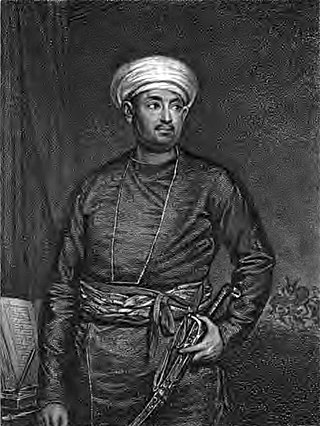
Abdelkader Taleb Omar is a Sahrawi politician who serves as the ambassador of Sahrawi Arab Democratic Republic to Algeria since 17 March 2018. He is a former prime minister.
Fatima bint Asad, was the mother of Ali ibn Abi Talib, married to Abu Talib, and an aunt to Muhammad.
ʿAbd al-ʿUzzā ibn ʿAbd al-Muṭṭalib , better known as Abū Lahab was Muhammad's half paternal uncle. He was one of the Meccan Quraysh leaders who opposed Muhammad and his followers and was condemned in the surah Lahab of the Quran for antagonizing Islam.

Ali was the cousin and son-in-law of the Islamic prophet Muhammad, and a member of the Ahl al-Bayt. According to Shias, Ali was the first Imam who is believed to be the rightful successor to Muhammad, divinely appointed successors of Muhammad who are claimed by the Shias. Although Ali was regarded, during the lifetime of Muhammad, as his initial successor, it would be 25 years before he was recognized with the title of Caliph (successor). According to the status of Ali (AS) it is believed he is infallible and sinless and is one of The Fourteen Infallibles of the household of Muhammed.

Sufi Abu Taleb was an Egyptian politician. He served as Speaker of the People's Assembly from 1978 to 1983 and, following the assassination of Anwar Sadat on 6 October 1981, assumed the duties of acting head of state for eight days per the Egyptian Constitution. He subsequently stepped aside for Sadat's Vice President Hosni Mubarak.
Imran, also transliterated as Emran is an Arabic form of the Hebrew male name ʿAmram in the Middle East and other Muslim countries. The name Imran is found in the Quranic chapter called House of ʿImrān. It is derived from the Biblical name ʿAmram.

Khalifa or Khalifah is a name or title which means "successor", "ruler" or "leader". It most commonly refers to the leader of a Caliphate, but is also used as a title among various Islamic religious groups and others. Khalifa is sometimes also pronounced as "kalifa". There were four khalifas after Muhammad died, beginning with Abu Bakr. The Khilaafat was then contested and gave rise to the eventual division of the Islamic Umma into two groups, the Sunni and the Shi'a who interpret the word Khalifa in differently nuanced ways.
Safiya is an Arab name, meaning "pure." Alternative transliterations include Saffiyah, Safiyyah, Safie, Safia, Safija, Safya, Sophie, Safiyah, Safeia, etc.
Abdul Malik is an Arabic male given name and, in modern usage, surname. It is built from the Arabic words Abd, al- and Malik. The name means "servant of the King", in the Christian instance 'King' meaning 'King of Kings' as in Jesus Christ and in Islam, Al-Malik being one of the names of God in the Qur'an, which give rise to the Muslim theophoric names.
Fred Robinson may refer to:
Abu Talib ibn Abd al-Muttalib was the leader of Banu Hashim, a clan of the Qurayshi tribe of Mecca in the Hejazi region of the Arabian Peninsula. He was an uncle of the Islamic prophet Muhammad, and father of Ali. After the death of his father Abd al-Muttalib ibn Hashim ibn Abd Manaf, he inherited this position, and the offices of Siqaya and Rifada. He was well-respected in Mecca.
ʿAbbās is an old Arabic name that means "Lion". The name traces back to Al-‘Abbas ibn ‘Abd al-Muttalib in 536 CE and Abbas ibn Ali, a son of Ali ibn Abi Talib, who participated in the battle of Karbala alongside his brother Husayn ibn Ali. Abbas ibn Ali is revered by Muslims, some of whom are named Abbas in remembrance and tribute to him. There is an Arabian tribe of the same name, the Banu Abbas.
Arar or Ar-Ar may refer to:
Meysam, Maitham or Maytham is an internationally used male name given name originating from the Semitic languages. The name comes from the Arabic root w-th-m and means crushing as in the sound made by the hooves of a horse or camel.
The Arabic nisbahAl-Dimashqi denotes an origin from Damascus, Syria.
Talib is an Arabic name, and may refer to:

Mirza Abu Taleb Khan was an Indian tax-collector and administrator of Iranian stock, notable for a memoir of his travels in Britain, Europe and Asia Minor, Masir Talib fi Bilad Afranji, written between circa 1799 and 1805.

Muhammad Ibn Abdullah Taleb Amoli known as Talib Amuli and Talib Amoli Iranian Tabari poet was of the early 17th century. He was the poet laureate of the Mughal emperor Jahangir from 1618 till his death. His poetry is in the “Indian Style” of Persian language. A poetry collection (divan) and the poem Talib and Zohre are the works that are left of him today. The fact that he read mathematics, geometry and philosophy in his poems reveals that he received a good education. He is also known to be a good calligrapher. Around 1010 AH, he traveled from Amol to Isfahan and from there to Kashan. After Kashan, the Taleb goes to Mashhad and from there to Marv to serve Bektash Khan. This ruler receives Taleb with respect. But the poet always dreamed of going to India, so he leaves for India. He for some time he lived in Delhi, then in Agra. In the end he ended up at the court of Mirza Ghazi Beg, the Mughal governor of Kandahar.

Feras and the alternative transliteration Firas is a given name and surname. Notable people with the name include:






